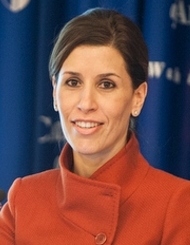Luciana Borio | |
|---|---|
 | |
| Born | |
| Academic background | |
| Education | George Washington University (MD) |
| Academic work | |
| Discipline | Medicine Public health |
| Sub-discipline | Infectious diseases Biodefense Health security |
Luciana Borio is a Brazilian-American infectious disease physician,public health expert,and venture capitalist. She is a Senior Fellow for Global Health at the Council on Foreign Relations, [1] and a Venture Partner at Arch Venture Partners. [2] From 2019-2021,Borio was a vice president at In-Q-Tel. [3] She previously served as director for Medical and Biodefense Preparedness at the National Security Council, [4] acting chief scientist of the U.S. Food and Drug Administration (FDA), [5] assistant commissioner for counterterrorism policy of the FDA,and director of FDA's Office of Counterterrorism and Emerging Threats. [6] She is known for her work advancing clinical trials, [7] [8] the development of medical countermeasures for health emergencies, [9] and the responses to domestic and international public health emergencies. [10]